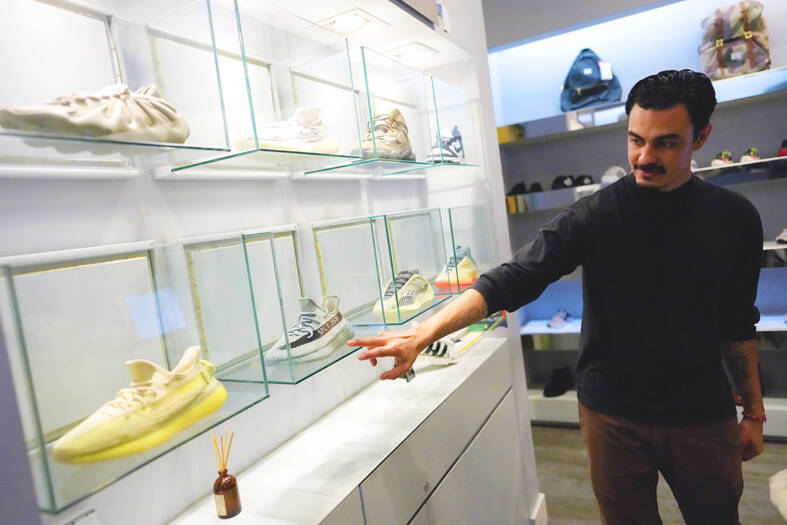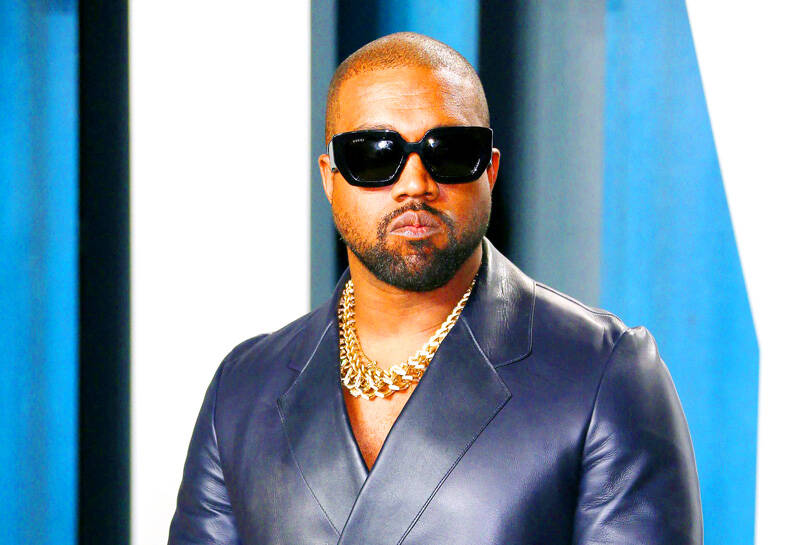Adidas AG slashed its profit forecast for the third time since July after ending its partnership with rapper Ye and discontinuing the lucrative Yeezy line of sneakers.
The German company now expects currency-neutral revenue for this year to grow at a low-single-digit percentage rate, down from a previous target of mid-single-digits.
It also trimmed its forecast for this year’s operating margin to 2.5 percent from 4 percent, the company said in a statement.

Photo: AP
Adidas also expects net income from continuing operations of about 250 million euros (US$251.8 million) this year, down from a target of about 500 million euros set in a statement on Oct. 20.
The lower targets reflect the company’s decision last month to end its collaboration with the rapper and designer, formerly known as Kanye West, following a string of offensive and anti-Semitic remarks.
The Yeezy line accounted for about half of Adidas’ total profits, analysts said.

Photo: AFP
Adidas yesterday reported third-quarter net income from continuing operations of 66 million euros, revising down its preliminary figure by almost two-thirds following the end of the partnership.
The company on Tuesday announced that Bjorn Gulden, former chief executive officer of rival Puma SE, would take over as CEO next year.
CHINA CHALLENGE
The company is seeking to revive its fortunes amid a panoply of challenges, including in China, once Adidas’s biggest bright spot, where sales were down by about one-third in the first nine months of this year amid consumer boycotts of Western brands.
Demand in Western markets has also begun to slow, as consumers feel the impact of surging inflation and concerns grow about a potential recession. That is creating a situation where unsold goods are piling up.
Adidas is hoping the World Cup soccer tournament, which starts this month, will provide a boost.
Traditionally, the event has led to a surge in sales of jerseys and soccer gear — although the unusual timing of this year’s event taking place in the northern hemisphere’s late autumn has so far limited the excitement.

A proposed 100 percent tariff on chip imports announced by US President Donald Trump could shift more of Taiwan’s semiconductor production overseas, a Taiwan Institute of Economic Research (TIER) researcher said yesterday. Trump’s tariff policy will accelerate the global semiconductor industry’s pace to establish roots in the US, leading to higher supply chain costs and ultimately raising prices of consumer electronics and creating uncertainty for future market demand, Arisa Liu (劉佩真) at the institute’s Taiwan Industry Economics Database said in a telephone interview. Trump’s move signals his intention to "restore the glory of the US semiconductor industry," Liu noted, saying that

On Ireland’s blustery western seaboard, researchers are gleefully flying giant kites — not for fun, but in the hope of generating renewable electricity and sparking a “revolution” in wind energy. “We use a kite to capture the wind and a generator at the bottom of it that captures the power,” said Padraic Doherty of Kitepower, the Dutch firm behind the venture. At its test site in operation since September 2023 near the small town of Bangor Erris, the team transports the vast 60-square-meter kite from a hangar across the lunar-like bogland to a generator. The kite is then attached by a

Foxconn Technology Co (鴻準精密), a metal casing supplier owned by Hon Hai Precision Industry Co (鴻海精密), yesterday announced plans to invest US$1 billion in the US over the next decade as part of its business transformation strategy. The Apple Inc supplier said in a statement that its board approved the investment on Thursday, as part of a transformation strategy focused on precision mold development, smart manufacturing, robotics and advanced automation. The strategy would have a strong emphasis on artificial intelligence (AI), the company added. The company said it aims to build a flexible, intelligent production ecosystem to boost competitiveness and sustainability. Foxconn

Leading Taiwanese bicycle brands Giant Manufacturing Co (巨大機械) and Merida Industry Co (美利達工業) on Sunday said that they have adopted measures to mitigate the impact of the tariff policies of US President Donald Trump’s administration. The US announced at the beginning of this month that it would impose a 20 percent tariff on imported goods made in Taiwan, effective on Thursday last week. The tariff would be added to other pre-existing most-favored-nation duties and industry-specific trade remedy levy, which would bring the overall tariff on Taiwan-made bicycles to between 25.5 percent and 31 percent. However, Giant did not seem too perturbed by the